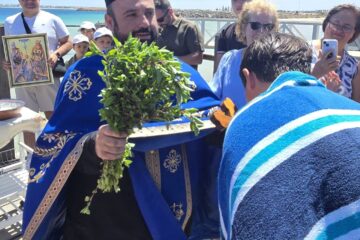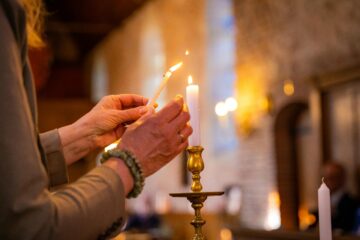Monk Agapios
From the Kyriakodromion of Monk Agapios
These ten lepers, in the most succinct manner, provide an image of the whole of human nature, which was entirely leprous and rendered useless by sin. It [i.e. human nature] had been justly expelled from Jerusalem Above, that is Paradise, just as the lepers were exiled from Jerusalem [on earth]. They couldn’t be cured by Priest, Levite, Prophet or any other person, not even by an Angel, unless the Mighty Counsel of the Most High, the Messenger coaeval and consubstantial with God, came down from heaven, and humanely became human in order to save us humans. All of us, then, had this leprosy. None of us was free from sin except those whom the all-wise Lord Christ had cleansed. Today, too, who among us doesn’t have this leprosy of sin upon them? No-one. Who can boast that they have no sins on their conscience? Avarice is a bad case of leprosy and one that’s an incurable passion, for just as leprosy consumes and eats away at our body, so too does avarice devour the soul and corrupt it. The same’s true of other crimes, such as lechery, adultery and all other sins, which are an untreated leprosy, of which we can’t be cured unless we hasten to the Lord Christ, the all-powerful Doctor, and cry aloud: ‘Lord, save me’. But the Lord didn’t want to save them there and then, though He could have; He sent them to the priests, in order to indicate to us that He has given priests the authority to cure each and every sickness of the soul and body. So let us, also, go to our priests and confessors to reveal our passions and receive healing.
Repentance has such power and grace that as soon as we make a move, in good faith and with a contrite heart, to go to our confessor and tell him our sins, before we even get there we invisibly receive forgiveness and healing from God, just as the lepers were cleansed before they reached the priests. There are some who say that they don’t go to confess their sins, because it’s enough that the Lord already knows them. What foolishness and vanity! Of course, God knows them, you blockheads, but unless you go and confess them to the priest, who is God’s representative, you won’t be saved [1]. If someone has an open wound and doesn’t show it to the doctor in order to be given the appropriate medication, they won’t be cured. By the same token, unless sinners reveal their passions to their confessor, they won’t be healed. Let us then find a way to remove the leprosy from our soul, to acquire perfect cleansing through confession. And then, when we’ve been healed, let’s not be like the nine, ungrateful for the grace they’d received, but let’s imitate the one, as being of the right mind, and let’s thank God every day for healing us. Even though God lacks nothing, that is, He doesn’t want anything from us, we’re greatly benefitted by the thanks we render to Him. We become more like His familiar friends, more conscientious in observing His redemptive commands; we recall His good gifts and so become inheritors of the future blessings of eternal bliss, to which may we all attain, in Christ Our God. To Whom be glory and dominion, always, unto the ages of ages. Amen.
1. We must always remember that confession in Orthodoxy isn’t legalistic, i.e. it’s not that you confess, the priest says the right words and you’re forgiven. It’s not ‘crime and punishment’. The point is to humble ourselves, to acquire humility, to become ‘in the likeness’ of Christ. A mere recitation of specific actions and thoughts is mechanistic. That’s more like telling the doctor how you came to be injured. This may help your confessor to guide you in your future conduct (i.e. in his spiritual advice to you), but it won’t cure your present sickness. [WJL].
Source: pemptousia.com




0 Comments